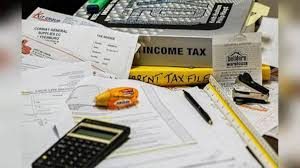 New Delhi: Tax payers will be filing the Income Tax Return (ITR) for the FY 2019-20 (AY 2020-21). This year Central Board of Direct Taxes (CBDT) has brought in the new Form 26AS for tax payers. CBDT says that this is the faceless hand-holding of the taxpayers to e-file their income tax returns quickly and correctly.
New Delhi: Tax payers will be filing the Income Tax Return (ITR) for the FY 2019-20 (AY 2020-21). This year Central Board of Direct Taxes (CBDT) has brought in the new Form 26AS for tax payers. CBDT says that this is the faceless hand-holding of the taxpayers to e-file their income tax returns quickly and correctly.
Here is all you need to know about the is Form 26AS and how it will benefit you
From this Assessment Year, taxpayers will see an improved Form 26AS which would carry some additional details on taxpayers’ financial transactions as specified in the Statement of Financial Transactions (SFTs) in various categories.
The information being received by the Income Tax Department from the filers of these specified SFTs is now being shown in Part E of Form 26AS to facilitate voluntary compliance, tax accountability and ease of e-filing of returns so that the same can be used by the taxpayer to file her or his income tax return (ITR) by calculating the correct tax liability in a feel-good environment.
This would also bring in further transparency and accountability in the tax administration.
The earlier Form 26AS used to give information regarding tax deducted at source and tax collected at source relating to a PAN, besides certain additional information including details of other taxes paid, refunds and TDS defaults. But now, it will have SFTs to help the taxpayers recall all their major financial transactions so that they have a ready reckoner to enable them while filing the ITR.
The Form 26AS for any taxpayer, from now onwards, will display in part E of the Form, different fields such as type of transaction, name of SFT filer, date of transaction, single/joint party transaction, number of parties, amount, mode of payment and remarks etc.
Furthermore, this would help the honest taxpayers with updated financial transactions while filing their returns, whereas it will desist those taxpayers who inadvertently conceal financial transactions in their returns. The new Form 26AS would also have information of transactions which used to be received up to Financial Year 2015-16 in the Annual Information Returns (AIR).